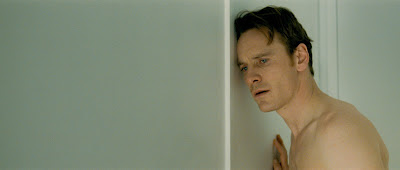After this film and his debut, Hunger, Steve McQueen is near
the top of my list as one of the most interesting people working in film today. He has a fine art background and shows in
museums and galleries around the world, and he bring this sensibility to feature
films. Shame has a rich visual quality
that engages in every scene, often in a unique way. At one point here, Brandon goes for a late
night run, and the camera tracks alongside him for blocks in real time, the
rhythm of Michael Fassbender’s strides communicating the character’s intensity
in coping with his situation while the blue-tinged streetscape passes along
beside him. McQueen favors long
takes. Several of the sex scenes go on
uncomfortably long, and we linger on Fassbender’s pensive, sculptural face in
several places, drawn into the character and trying to think along with
him. Similarly, Brandon’s dinner with
Marianne is a series of long takes, the opening one the most impressive. After Brandon arrives late, the camera
watches like an anthropologist as the two diners exchange greetings and the
server comes to the table to deliver the welcome, menu rundown, and questions
we experience every time any of us goes out to eat. Here, the real-time, available light prise de
vue creates an analytic feeling to the scene, asking us to study all the
familiars for signs of significance. And
after the many long, deliberate takes and rigorously linear storytelling,
McQueen approaches the end of Shame with a series of shorter, non-linear flashbacks
anchored in a visit to bar and a beaten Brandon on a train. And even these two temporal anchors are fragmented
and presented out of order. Not only is
this segment of the film more elegantly edited than a David Fincher flourish,
but the form echoes the fracturing of Brandon’s monolithic, impassive psychology. This section of the film is tour de force of
cinematic beauty.
Like in Hunger, though, McQueen goes beyond the visual
beauty of fine art cinema to create a fascinating, complex character. Fassbender’s Brandon engages no one in the
film, neither at work, with family, nor socially. Psychologically sealed off from human
contact, he is obsessed with sex either with strangers he meets in bars or the
subway, alone in frequent masturbatory sessions, or on line with pornography or
paid service sites. Sensual jolt is the
only feeling that gets through Brandon’s wall. As portrayed by Fassbender,
Brandon’s isolation has a fierceness that borders on frightening.
Such psychological intensity could only be countered by an
equal intensity, and Brandon’s sister Sissy brings that into his life. Carey Mulligan’s Sissy Is the opposite of
Brandon to the extent that she wants involvement with others rather than
rejects it, but he matches him in her intensity. She needs, even craves, interaction with
others every bit as much as Brandon rejects it.
We hear her begging her boyfriend to take her back, and we watch as she
allows Brandon’s sleazy boss David to pick her up for a fast moment of
fun. We soon find that that she’s cut
her arms many times, a gesture calling for attention. Her demand and his rejection make an oddly
necessary sibling pairing in Shame.
We see a couple of clues that the psychological intensity of
the two has its base in some early experience.
Sissy’s rendition of "New York, New York" has an intensity
that suggests lived experience, and Brandon’s tear on hearing it shows the
intensity of his response. Both had clearly wanted to leave where they were to
head to the bright, saving lights of New York.
We also hear a phone message that Sissy leaves Brandon that says, “We’re
not bad people. We just come from a bad
place.” Both are intensely damaged
individuals, and it clearly takes Sissy to break through Brandon’s repressions.
Ironically enough, the only character in Shame to whom I’d
apply the label is David, Brandon’s boss. This is a man who is perfectly willing to
pick up an employee’s sister for a one-night stand, have sex in the employee's apartment, and the next morning complain
about pornography on the employee’s computer while chatting online with his
child about his wife. The damaged
Brandon and Sissy may not act in an acceptable fashion, but they clearly have a
major psychological trauma in their background.
It’s the hypocritical husband and father who should feel shame.
Shame is a unique, tremendously affecting portrait of a man who has been damaged and turns to sex as a substitute for the human contact he can't experience. For that achievement alone, this film is worthwhile.


No comments:
Post a Comment